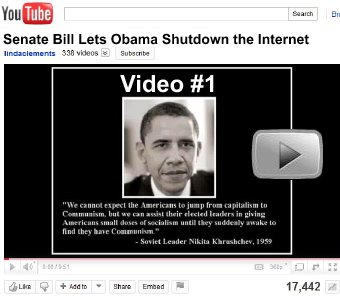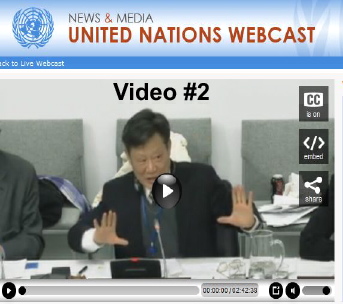
News
Behind the Headlines
Two-Cents Worth
Video of the Week
News Blurbs
Articles
Testimony
Bible Questions
Internet
Articles (2012)
Internet Articles (2011)
Internet Articles (2010)
Internet Articles
(2009)
Internet Articles (2008)
Internet Articles (2007)
Internet Articles (2006)
Internet Articles (2005)
Internet Articles (2004)
Internet Articles (2003)
Internet Articles (2002)
Internet Articles (2001)


![]()
When Sen. Jay Rockefeller's
[D-WV] Cybersecurity Act of 2009 ended
up in a cyber-black hole on Capitol Hill, Sen Harry Reid [D-NV] tried
unsuccessfully to break it loose and bring it, without any committee
debate or votes, to the floor for an up-or-down vote. Because no
member of Congress wanted their name attached to a bill that would
abrogate what three federal judges said was protected by the First
Amendment, Barack Obama's FCC simply wrote the regulations and
seized the Internet under the guise of protecting the little guy.


As
Obama's minions at the Federal Communications Commission seized the world's
greatest media treasure on Dec. 21 by simply regulating that which, constitutionally,
four recent federal court decisions, including the US Circuit Court of
Appeals for the District of Columbia which, on April 6, 2010, told the
Obama FCC they lack either a constitutional or congressional mandate to
regulate the Internet.
In the first of three prior appellate court decisions, the three judge panel in American Civil Liberties Union v Reno ruled that the Internet is "...a publishing medium [in which]...personal home pages are the equipvalent of individualized newsletters about that person or organization." (929 F. Supp at 837). The judges concluded that the Internet deserves as least as much protection under the 1st Amendment as printed matter receives. The appellate court emphasized that any analysis of the 1st Amendment protections afforded to a particular medium of mass communications must focus on the underlying technology that brings the information to the user. Thus, they concluded, the Supreme Court's two primary theories of government regulation of any form of broadcast communications content—NBC v United States (319 US 190 [1943]) and FCC FCC v Pacific Foundation (438 US 726 [1978]) do not justify government regulation of the Internet.
Which, of course, is the reason Sen. Jay Rockefeller's Cybersecurity Act of 2009 (part of an international regulatory effort by globalist political hacks and totalitarian regimes through the United Nations to seize the Internet by restricting access to the onramps of the information superhighway much as Australian did for 60 minutes (from 7:50 to 8:50 a.m. on Sept. 2, 2009 by shutting down the ithe State-owned Telstra international Internet network which feeds over 90% of Australia's ISPs.)
With the Election of 2010 still festering in his mind, and the impact of the Teap Party Movement serving as a foreboding warning for 2012 as Tea Party activists strengthen their political base through their growing contacts on the information superhighway, Barack Hussein Obama intends to suppress political dissent in the United States by simply outlawing it by denying political oppositions unfettered access to the onramp of the information superhighway.
Yet, as the Obama Administration is racing at breakneck speed up and down the information superhighway checking all of the onramps, the United Nations is preparing its own coup, as it holds hearings on its right to control the information superhighway because as it traverses the globe, it intrudes in that invisible domain the UN has claimstaked called "internationalism."

Copyright © 2009 Jon Christian Ryter.
All rights reserved.